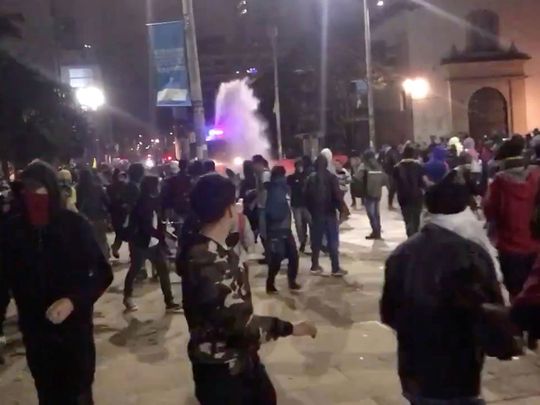
Colombia's first curfew in decades turned its capital city into a nervous ghost town, as people armed with machetes, bats and knives guarded doorways against hooded looters thought to be running wild.
Acts of vandalism broke out in some areas of Bogota late on Friday, a day after a general strike and mass demonstrations against the government of President Ivan Duque.
For many in the city it was their first taste of a curfew. The last one was in 1977, also during a general strike, and came years before drug cartel-related violence became rampant and the country's war with leftist guerrillas intensified.
This time, people looted stores, clashed with police and vandalized public and private buildings.
"We are not street gangs, but rather families that are taking care of their property," said Santiago Palacios, a gym trainer guarding his house in the San Cristobal neighborhood of northern Bogota.
Wielding a stick for protection, he drank cup after cup of coffee to stay awake as reports reached him over the WhatsApp messaging system of alleged attacks all over the city.
Palacios and his neighbors appeared to be victims of what Mayor Enrique Penalosa called a "wave of panic".
The mayor said there were some cases of homes being burglarized but overall the city had been hit with "an orchestrated plan to trigger panic," as false information spread rapidly over social media.
Police said shots were fired and fights broke out in some areas, but mainly these were cases of confusion among vigilantes protecting property.
Palacios and his neighbors wore white T-shirts to identify themselves as good guys, not looters.
AntRare curfew after violence in Colombia puts people on edgei-foreigner anger
The wave of violence was concentrated in working-class areas of southern Bogota, a city of seven million people; the north is more upscale.
The mayor stopped short of linking it directly to Thursday's big demonstrations against Duque, calling it instead the work of a small minority of delinquents.
The popularity of Duque's rightist government has been on the wane since his election 18 months ago, as it deals with hosting 1.4 million refugees from neighboring Venezuela's economic meltdown as well as the complex fallout of a 2016 peace deal with FARC rebels and still-rampant drug trafficking.
In the demonstrations Thursday, hundreds of thousands of Colombians took to the streets of Bogota and other cities to protest Duque's economic, social and security policies.
Colombia thus became the latest Latin American country to experience social upheaval, after Chile, Bolivia and Ecuador.
Around midnight, the authorities said the city was under control and the vandalism had stopped.
But the self-declared protectors did not let down their guard and, without proof, word spread on social media that the looters were Venezuelan migrants who have arrived in huge numbers fleeing the economic crisis in their country.
"We have not seen them but they have been robbing, let's say, as they know how to do, as they come up from the south" of the city, said Palacios, the gym trainer.
Many of the 300,000 Venezuelans now in Bogota live in the areas hit hardest by the unrest.
One of those areas is Patio Bonito - bonito means pretty - an oddly named area of nightclubs and prostitution where dozens of people looted stores, set fire to a bus station and tried to lynch a police officer. Footage of this last attack was broadcast on TV.
On streets strewn with rocks, broken glass and burning tires, soldiers worked into the early hours to bring under control people who were out in defiance of the curfew.
Challenging the curfew
Unlike working-class southern Bogota, in the affluent north people rallied outside the private residence of President Duque.
Locals in their pajamas and people from other neighborhoods came together to denounce government policies with a noise that was not common in Colombia until Thursday's demonstrations: banging pots and pans in a cacophony made popular in Chile in the 1970s in protests against socialist president Salvador Allende.
Wilson Sanchez, a 43-year-old farmer who traveled from neighboring Boyaca department to Bogota to join the protests, said the Colombian president has abandoned the working class.
"I want Duque's resignation," Sanchez said.
Luis Lozano, a university student, said protests in northern Bogota are rare because life there is good and social services are present.
"The north is where the state is in fact noticed," he said.
More pot-banging is expected later Saturday.












